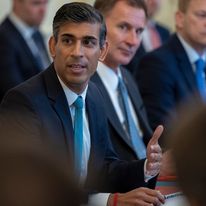A few weeks ago, the UK was convulsed by the resignation of Prime Minister Liz Truss, who left office after a month and a half. The Conservative Party appointed Rishi Sunak to the post. In Container and Contents, Pressenza’s Spanish weekly radio programme, we interviewed Antonio Carvallo, seeking to understand a little better what is happening.
Q: You are currently living in the UK and I’m sure you will be able to provide us with elements to understand what happened in that month and a half of the Prime Minister’s term, in that short time, what has accelerated her fall, how can that be explained?
AC: Well. You know that London is a key financial centre and that the British economy, is totally linked to the US economy. Let us say it is like an American agency, and has been for many years since the fall of the British empire and the American take over, let’s say 1945. They take their orders from Washington, it has been like that, with more restraint at other times, but it has been like that since the end of the second world war and euphemistically called “the special relationship”. We had the case of Tony Blair’s government, which started as Labour, after many years of Conservative government, and then within two or three years it was following Bush’s directives, joined in the Iraq war adventure and betrayed its Labour principles, if they ever had any.
That has happened time and time again in recent British history. The leaders who were elected, during this rather chaotic period since the resignation of Cameron, that is Teresa May, Boris Johnson (who called and won a general election by politicizing Brexit in an extreme way), and finally Liz Truss have resulted in a chaotic political landscape.
Moreover, this landscape has changed a lot in the last 30 years. Faced with a process of ideological hollowing out, the Conservatives won a large majority by manipulating public opinion particularly with regard to the decision to leave the European Union. This electoral majority was obtained, as is well known, with significant support from a market research group, Cambridge Analytica, part of American SCL Group.
All that was managed by Cambridge Analytica market research entities and the Conservative Party ended up with a majority of 70 members of parliament. That has given them a considerable advantage, which otherwise would not have been possible because of the very serious problems in the country, social problems, economic problems and the chaotic political landscape.
Q: In this difficult context, the Prime Minister leaves office shortly after taking over and the Conservative Party finds this new figure. What do you think?
After the Johnson failure the Conservatives were looking again for a figure that could sell, as they did with Johnson. She was to project herself as the new Margaret Thatcher. Unfortunately, she has no political experience, she has no understanding of how the economy works. After announcing a mini budget, to show the economic direction of her government, reducing taxes to corporations and increasing government borrowing the markets reacted so negatively that the economy almost collapsed. She thought, all was about saying attractive things, like fireworks and projecting herself as the new Margaret Thatcher, but without any substance, without any real basis, and in the midst of the current crisis.
Q: And what is the profile of the new prime minister, Rishi Sunak?
AC: Well. You know he has a different political style. He is from an Indian family. He served in Johnson’s cabinet from the beginning, he was chancellor and had to respond financially to the crisis created by the pandemic. He created support to the economy with ad-hoc finance to avoid massive bankruptcies and loss of employment during the lock downs. As chancellor, he had to create that strategy and make it available to the British public, and that helped to navigate the pandemic years with a certain stability, because nobody was left without food. They managed to navigate the situation. Amidst all the discredit generated by Johnson and what happened with Truss, Sunak appeared to be one of the few stable elements.
Q: So, what can we expect from this Prime Minister?
AC: I think he will bring some stability to the last years of the conservative government. You know they have five years between elections; they’ve already burnt down two and a half, they have another two and a half years left.
If they were to call an election tomorrow, they would lose to Labour, all the opinion polls show that. But it is a Labour party on the Tony Blair model, so you can’t dream too much either.
The two main parties represent with small variations more or less the same, it’s a bit of a depressing thing about this political environment. Although there are many progressive people, talented people, creative people who keep growing and developing, multiplying, building a different vision, creating in lots of fields while the state and the political establishment, (tired establishment), goes nowhere. If they were locked in Westminster let us say for five years the country would thrive.
Q: So, if the Conservatives are lucky, they can have this prime minister for two and a half years and eventually improve their popularity a little bit because the man is capable.
Maybe. He seems talented, on his own merit, not only because of his wife’s fortune. He has had a good education, he has distinguished himself in his studies of economics above all, and at the same time, in the first two years he did a good job as Chancellor. A bit of decency also, because with the others (Johnson et al), people were already disconcerted and the country in a drift.










